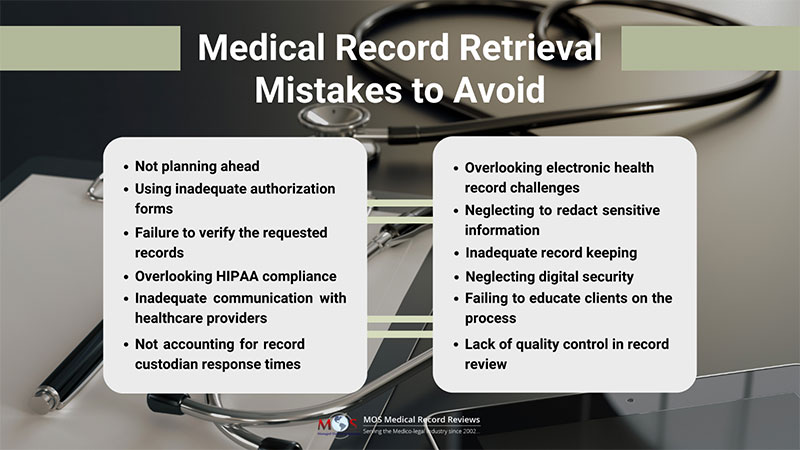In the legal realm, accurate and comprehensive medical record retrieval is often a crucial element in building a strong case. However, the process of retrieving medical records can be rife with pitfalls that may compromise the quality and reliability of the information obtained. So, it is crucial that certain key aspects are kept in mind when retrieving medical records. We highlight some common mistakes that law firms should avoid when navigating the intricacies of obtaining medical records for their cases.
MOS provides secure and timely medical record retrieval services for attorneys.
Twelve Medical Record Retrieval Mistakes to Avoid
- Not planning ahead: Often, law firms do not immediately start the retrieval process. It is best that the retrieval is started immediately. Also, high-priority cases should be given more importance. By planning ahead, you can allow sufficient lead time to retrieve the records.
- Using inadequate authorization forms: Authorization forms are the gateway for obtaining the medical records. So, law firms must confirm that the authorization forms are comprehensive, specific, and compliant with all applicable privacy laws.
- Failure to verify the requested records: Law firms may sometimes neglect to cross-check the records they receive against the requested documents. This oversight can lead to incomplete information, missing crucial details, or even the inclusion of irrelevant data. Verifying that the obtained records align with the requested scope is vital for building a solid foundation for legal proceedings.
- Overlooking HIPAA compliance: Health Insurance Portability and Accountability Act (HIPAA) regulations are stringent when it comes to the protection of patients’ health information. Law firms must ensure that their requests and subsequent handling of medical records adhere to HIPAA guidelines. Failure to do so can result in legal consequences and damage the credibility of the obtained records.
- Inadequate communication with healthcare providers: Effective communication with healthcare providers is key to a smooth medical records retrieval process. Law firms sometimes make the mistake of being unclear about the specific records needed or failing to establish a rapport with the medical staff. Clear and concise communication helps in speeding up the process and reduces the likelihood of errors.
- Not accounting for record custodian response times: Many law firms underestimate the time it takes for healthcare providers to respond to record requests. Failing to account for the varying response times can lead to delays in obtaining critical information. It’s essential to plan ahead, set realistic expectations, and follow up promptly to ensure timely receipt of the required medical records.
- Overlooking electronic health record challenges: As healthcare systems transition to electronic health records (EHRs), law firms must adapt their strategies accordingly. Retrieving electronic records may present unique challenges, such as navigating different EHR systems and dealing with diverse data formats. Being well-versed in these challenges can streamline the process and prevent unnecessary complications.
- Neglecting to redact sensitive information: Once medical records are obtained, it is the responsibility of the law firm to obscure any sensitive or irrelevant information before presenting them in court. Failure to redact properly can lead to privacy breaches and potential legal repercussions. Thoroughly reviewing and redacting sensitive information is a crucial step in maintaining the integrity of the records.
- Inadequate record keeping: Law firms may overlook the importance of meticulous record-keeping throughout the entire process. Keeping detailed logs of requests, communications with healthcare providers, and the status of each record request is essential. This documentation not only helps in tracking progress but also serves as a valuable reference in case of any discrepancies or legal challenges.
- Neglecting digital security: In the age of digital information, the security of electronically transmitted medical records is paramount. Law firms must employ secure and encrypted methods when sending or receiving sensitive health information to prevent data breaches. Neglecting digital security can compromise the confidentiality of the records and erode trust with clients.
- Failing to educate clients on the process: Clients may not fully understand the intricacies of obtaining medical records and the potential challenges involved. Law firms should take the time to educate their clients about the process, expected timelines, and possible hurdles. Managing client expectations can prevent frustration and maintain a transparent and communicative attorney-client relationship.
- Lack of quality control in record review: After obtaining medical records, law firms must conduct a thorough review to ensure accuracy and relevance. Failing to implement quality control measures can result in overlooking critical details or misinterpreting information. A meticulous review process enhances the reliability of the obtained records and strengthens the legal strategy.
Medical record retrieval requires careful attention to detail and adherence to legal and ethical standards. By avoiding these common mistakes, law firms can enhance the reliability of the information they obtain, ultimately strengthening their cases and contributing to the pursuit of justice. By steering clear of these additional pitfalls, law firms can navigate the medical records retrieval process with greater efficiency, accuracy, and adherence to legal and ethical standards.





